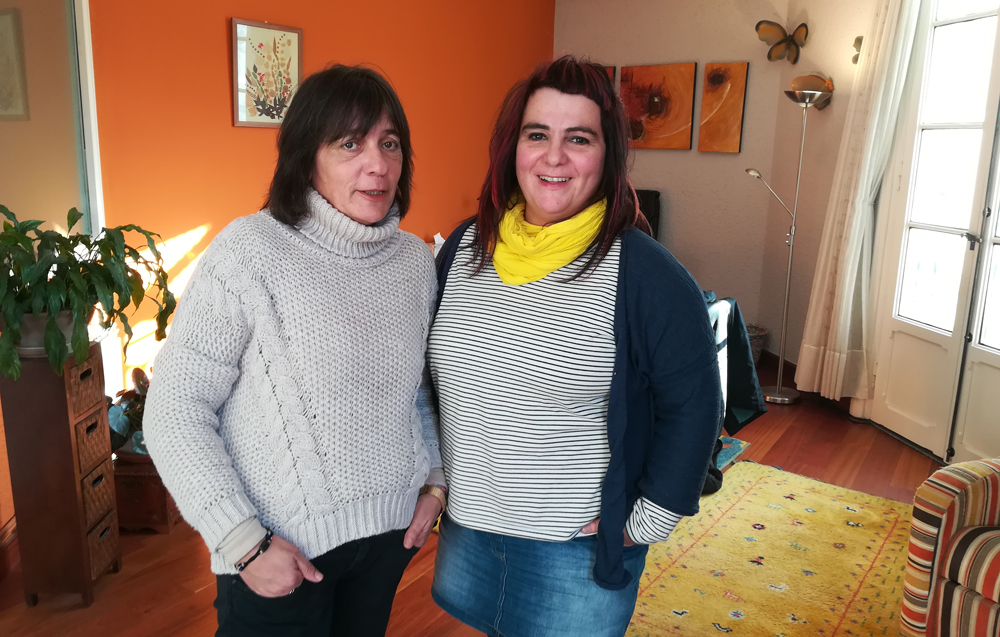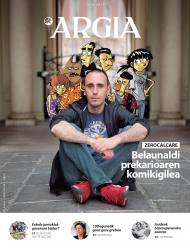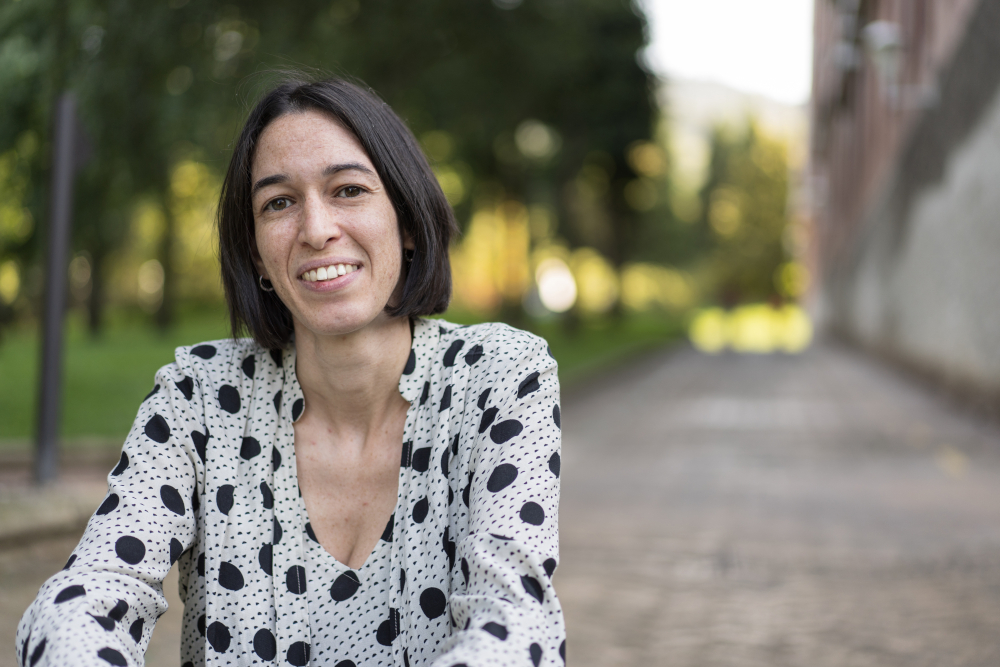In search of the liberating balances between war and the self
- In companies, schools, sports teams… there is no shortage of psychologists; what was art, humor or bathing today is artetherapy, barretherapy and hydrotherapy, and in our conversations it is usual to use a bipolar, neurotic, depressive or psychosomatic terminology... We've gone from Homo politicus to homo psychologicus, also in militant environments.

We start from the hypothesis that in the last decade and on the left-militant environment of Euskal Herria, the number of people who are or have been on some type of psychotherapy has increased considerably. Beyond working the concerns, wounds or ghosts linked to militancies and struggles, to also address other pain and dimensions of life. We've asked four people about this perception. We met in Bilbao with psychologists Nagore Lopez de Luzuriaga Comunion and Olatz Barrenetxea Larrondo. Both have private consultations and are related to the national construction. Iban and Arkaitz Martínez de Albeniz and Lopez de Subijana have been in charge of making the visit to the Alavesa capital. Administered from a young age to the militancy, they began therapy for various reasons and moments. Therapies have been reconciled with formations over the years. All four coincide with the initial hypothesis, but what does the growth of psychotherapies respond to? Why was this dimension and personal work less used in the past? Why now more? What strengths and weaknesses does this trend respond to?
Arkaitz Martinez de Albeniz: "In the field of militancy, I have felt a certain punishment for working in the personal sphere. It's hard to manage this dichotomy."
The weakening of war... and enrichment Some of the
reasons for Psychology are related to Western transformation and trends. “An ‘internal revolution’ has taken place in postmodern societies: an impressive ‘movement of consciousness’, an unprecedented interest in knowledge and personal realization (...) The political sensitivity of the 1960s has given way to ‘therapeutic sensitivity’. (...) Self-awareness has replaced class consciousness, narcissistic consciousness with political consciousness,” wrote the philosopher Gilles Lipovetsky. But what is narcissistic, paying attention to the self or the way to do it? “Caring for the individual is not feeding narcissism or egocentrism. I believe that the two things, personal and collective, can be reconciled” says Iban. All interviewees give importance to the care of the personal dimension and to the self-knowledge.
The Basque Country has for decades been an unnormalized country, at least from the paradigm of Western capitalist democracies. We can place the trunk of abnormality in the national identity of the left and in the very widespread radical struggles associated with it – on the other hand, a trunk of many branches. While in the West postmodernity in general dissolved deficiencies and, in particular, those of the left, Euskal Herria remained stronger, and the collective and community networks were more animated. A whole political culture was developed around these struggles and a model of the person within them. However, fragility has been weakening; today we are a more normalized people. The change in the political cycle that characterized the armed struggle is probably a consequence of this weakening.
From this point of view, the multiplication of psychotherapies can be the result of a loss, a feeling of “non-participation”. “I do see that that collectivity is weaker. There has been a lot of drift in the five or ten years, and in that sense more personal doors have been opened, not just psychotherapy,” says Arkaitz. Among other personal therapeutic doors, the two brothers talk about mountain racing, laughing, but not joking. Oppositions or drugs could also be mentioned, for example.
But the transformation is not only about the loss, but also about the liberator. In Barrenetxea’s opinion, “what has brought militancy and struggle is a powerful ‘we are’, but the missing self.” López de Luzuriaga says that for many years the imaginary of this insufficiency has been that of a male militant from the 1980s: “Not to abandon the emotional space because it was associated with weakness; ‘negative’ emotions such as fear or sadness, giving reason to the enemy; security and firmness had to be demonstrated.”
The lack of militancy experienced by the Martínez brothers of Albéniz was often stiff and suffocating. In the decade of illegalization, militancy began in the structures of the Left Abertzale. “On the one hand, the image and model of militancy, the need to be strong and safe, on the other hand feeling like shit and all my misery: it was very difficult for me to combine both,” Iban acknowledged. Arkaitz speaks in the same line: “What I lived in another time was contrary to the plurality of forms of character and militancy. I was very engraved with the 24-hour militant. Hardness was the central value. And in jail, the same thing. I went out to the street in 2009. Political change helped me to live that 24-hour militancy in a calmer way, to pull out and to work on the fragile aspect that allowed me.”
Arkaitz had a very superficial first contact with psychotherapy in prison, with the psychologist of the Prisoners Collective. Upon leaving, she decided to resume her therapy. At first, to work injuries linked to militancy and prison. But he soon felt that self-knowledge went much further. They were going to start psychotherapy later, about eight years ago, at 26. “I started with a personal crisis. At first I saw it as a patch, now I have integrated it into my life.” Iban had a strong public image of a militant. Arkaitz recalls the time when Iban “fell”: “It was ‘fuck’ for many, if this falls, if Iban is fragile, I could also fall.” Some in a positive sense, ‘I can also afford to fall’; others in fear, such as the dismantling of assurances.”
Nagore López de Luzuriaga: "If we dedicate ourselves to making revolution, there will be less depression."
Strengthening the self... and impoverishment After
a long time abandoned, the self gains presence and breathes more freely among us. In Iban’s opinion, “Now that everything has relaxed, there are better conditions to bring to light the deficiencies we had before.” “It’s expanding as you have more capacity to look at yourself in a holistic and comprehensive way,” says López de Luzuriaga.
However, in the name of attention to the individual, capitalism sells us egoism. Social problems become deficiencies and personal guilt. The most reliable help is self-help, the way you're right about yourself, working on self-esteem. In the field of psychotherapies the offer is varied, but the most numerous are the cognitive-behavioral and pharmacological ones, centered on short-term efficiency, on the neural vision, on the elimination of symptoms and on the abandonment of elaboration.
“Collective or social understanding is not given. The goal is not to need anyone and to adapt to yourself, precisely when loneliness is what makes us sick”, says López de Luzuriaga. “Are people sick? Society is sick and we live in that society”, Barrenetxea.
Quality also has a lot of therapeutic. The same delicacy as the asphyxiation guarded Arkaitz: “I have been very protected at many times. Horribly imprisoned. With all the value he has.” “My teacher said that what makes life more meaningful is the feeling of belonging, sharing common ideals. If we dedicate ourselves to making the revolution, there will be less depression,” says López de Luzuriaga. Not only big, but also close people and people with bone and meat are therapeutic. In other words: if I am depressed by a job that puts me in competition with the other workers and exploits me completely, I am sure that it is more therapeutic than going to the therapist, the complicit relationship with a fighting partner or union.
Olatz Barrenetxea: "Psychology should focus on the psychosocial aspect, not so much on individual therapy. That is really the way to achieve a healthy society."
Both Barrenetxea and López de Luzuriaga consider that feminism has helped to accommodate people
and their fragility. It is significant that the world of psychotherapies in general is a very feminized space, since not only fragility, but also care is feminized. López de Luzuriaga does not appreciate that much difference between people who practice therapy. The relationship of men's denial with frailty may be expected to be less, but at the same time, the difficulty of sharing frailty may increase the need for professional support in certain circumstances. And therapy can be more acceptable, because it can be kept secret. Despite this, in the last decade the proportion of men has increased compared to 2015. Signs that virility models are changing?
The Martínez de Albéniz brothers have put the case of masculinity in the street at the centre. The fall of Iban, for example, would not have come as a surprise if it had not been a man: “We used to comment at some point among fellow militants who have committed crack, that in our case there has been a cojonímeter. A traditional, unrevolutionary model.” Arkaitz goes further: “I in the militancy have felt a certain punishment for working in the personal sphere. It is difficult to manage this dichotomy.”
Beyond .jpg) the pendulum, with liberating balance as an objective In decades the letter has prevailed – which has virtues, but too repressive with yo-, and now the self has taken the greatest prominence – which has positive aspects, but which liberates links with others and with transformative misery. Here's
the pendulum, with liberating balance as an objective In decades the letter has prevailed – which has virtues, but too repressive with yo-, and now the self has taken the greatest prominence – which has positive aspects, but which liberates links with others and with transformative misery. Here's
the pendulum. “It’s not healthy either. But I think we have to go through that process, personally and as a people,” says Arkaitz.
Psychotherapy serves to calm people's suffering or self-knowledge, but it is also a tool for building healthier and freer societies. To do this, we need other kinds of therapies. Our four interlocutors have criticized the peridy-ignorant relationship, that is, the mental, emotional and decision-making health of the person who is going to therapy. Self-knowledge is not complementary to "express therapy", it takes time and effort. Barrenetxea claims collective therapy: “Psychology should work on the psychosocial aspect, not so much individual therapy. That’s really the way to get a healthy society.” Not forgetting that not all suffering is a disease, that self-knowledge and therapy do not necessarily or alone through psychotherapy, that in order to live with the wounds of life or with the ghosts themselves are more necessary than the experts, that without a close and malign affinity one cannot relieve the pain of people, and vice versa, that without strong and malignant people one cannot overcome collective pain.
We are now talking more about mental health, psychological well-being and its impact on our quality of life. It is a source of joy, because it helps to get the subject out of the closet, because by showing that the pain we all have (and not a few) the discomfort normalizes and... [+]
Haur eta gazteen egoera emozional eta psikologiko txarra dela-eta, irakasleak gaindituta daudela eta ikastetxe bakoitzean psikologo bat ezarri beharko litzatekeela aldarrikatzen du mugimendu batek. Hari horri tiraka, jakin nahi izan dugu zein den pandemiak eskoletan utzi duen... [+]
Last summer I taught a course on the prevention of neurosis as part of the Hik Hasi educational meetings. Many people signed up because the title was attractive, the safest, because it implied that mental health (or lack of health) is not something random, but something that can... [+]
The third meeting of Basque psychologists was held in Eibar in November 2019. The meeting highlighted the need to create a network between those of us who have psychology and Basque as a Nordic language. It also seemed urgent to us to make visible and share the work of those who... [+]
Gero eta eremu gehiagotan musukoa kentzeko aukera ematen ari zaizkigunean, fenomeno esanguratsua atzeman dute hainbat nerabe eta gazterengan: ez dute musukoa kendu nahi, norbere konplexuak, segurtasun-gabeziak eta autoestimu baxua ezkutatzeko aproposa baita maskara, kanon... [+]






















